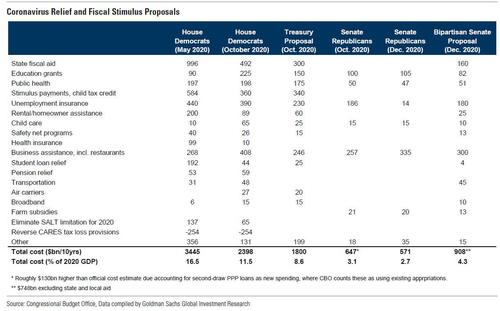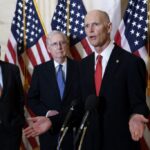Goldman Now Thinks Virus Aid Will Pass This Week, But Will Be Last
“Substantial” Package Unless Dems Win Georgia Tyler Durden Tue, 12/15/2020 – 15:30
Having flip-flopped once already, back in
September capitulating on expectations for a fiscal stimulus
this year (which earlier this year was the basis for the bank’s
bullish outlook), Goldman has just flip-flopped again in its views
on a covid stimulus deal, and moments ago Goldman’s chief political
economist Alec Phillips just sent out a note in which he said that
“over the next day or so, Congress is likely to decide whether to
pass fiscal relief measures or to push consideration of most of
them to next year” adding that “the odds of a fiscal deal before
year’s end have been improving” and “at this point, we
think it is slightly more likely than not that Congress will pass
this week a package similar to the recent $748bn bipartisan
proposal, which would be close to our standing assumption of a
$700bn (3.3% of GDP) package.” Translation: a deal will
pass in the next 48 hours.
And while it appears increasingly likely that a small package
will pass this week, Goldman concludes that “this is likely
to be the last substantial COVID-relief package unless Democrats
win both Senate seats in the January 5 runoff elections in
Georgia.”
Here are the main points from the Goldman note:
1. Some COVID-relief provisions are likely to pass this
week, but the broad $908bn package that a bipartisan group of
senators has released looks fairly unlikely, in our view.
Statements from congressional leaders in both parties seem
reasonably clear that they do not believe they can leave Washington
without an agreement on COVID-relief measures. However, the issues
that have hung up fiscal talks for the last few months remain
unresolved: state and local fiscal aid, which Democrats seek, and
liability protections for businesses, which Republicans want. While
there is a small chance that these issues could be resolved soon,
in our view the path to a deal at this point appears to be for
lawmakers to put both issues aside. Senate Majority Leader
McConnell (R) proposed setting these aside last week. As of Monday
(Dec. 14) evening, Speaker Pelosi (D) has continued to press for
state and local aid. However, comments from other senior Democrats,
including Senate Minority Whip Durbin and House Majority Leader
Hoyer suggest that Democrats might be willing to support a deal
without state and local aid. If congressional leaders put this
issue and liability protections aside, it looks likely that a broad
package of COVID-relief measures will pass this week.
2. The deadline to announce an agreement is tomorrow or,
at latest, Thursday. Congressional negotiators appear to
have reached agreement on legislation to fund the government for
the remainder of fiscal year 2021 (through Sept. 30, 2021).
Legislative text of that spending bill is expected to be released
today (Dec. 15). For financial markets, the details of the spending
bill are less important than the fact that it sets a deadline for
COVID-relief talks. Spending authority for the federal government
expires Dec. 18. Without another extension, the federal government
would partially shut down. In order to meet that deadline, the
House will need to pass its bill and send it to the Senate no later
than Thursday. This means that a deal on COVID-relief would need to
be added to that bill by Wednesday evening (Dec. 16) or, at latest,
Thursday morning (Dec. 17). Even on that timeline, procedural
delays could delay final passage past Dec. 18 unless all Senators
agree to put aside procedural objections. That said, if a shutdown
occurs it would be short-lived with little macroeconomic impact.
The next step in the process will be a meeting at 4pm ET today
among Democratic and Republican leaders of the House and
Senate.
3. Fiscal relief provisions look likely to ride on the
spending bill. At a minimum, it seems very likely that
Congress will extend several policies that expire around year-end,
like broadened eligibility for unemployment insurance (UI), student
loan payment deferral, and the eviction moratorium. At this
point, congressional leaders appear slightly more likely than not
to include most of the other aspects of the bipartisan $748bn
proposal (summarized below). The largest of these would be
another round of loans through the Paycheck Protection Program
(PPP) for hard-hit businesses, payments to states to cover
COVID-related education costs, and public health funds for
activities like testing and vaccine distribution. A $300/week UI
top-up payment through March also looks likely. While we think that
there is already some expectation in financial markets that
Congress will agree to a broad package this week, we note that as
of this morning the “superforecasters” put only a 35%
probability on passage of a $750bn or greater package before
year’s end.
4. Our base case for additional stimulus remains $700bn
(3.3% of GDP). At this point, the discussions appear to be
shaping up similar to our own expectations regarding the size of
the additional fiscal measures. However, while we believed that
Congress would provide around $200bn to state and local
governments, it looks likely that if Congress acts this month, it
would include only around $100bn for state and local governments,
directed to schools.
5. A deal might have limited implications for this
week’s FOMC meeting. We believe the Fed is slightly more
likely than not to extend the weighted average maturity of its
Treasury purchases, though this has been a close call. The
announcement of a fiscal agreement prior to the FOMC meeting would
reduce the odds of a WAM extension somewhat, although there is a
fair chance that a deal would not be finalized until after the FOMC
meeting has concluded.
6. If Congress acts this month, it could be the last major
installment of fiscal relief. If Congress passes fiscal legislation
this month, it will likely create a new set of expiring policies in
March or April 2021, which could pressure lawmakers to pass
additional fiscal relief. While this might create some upside risk
to our fiscal assumptions, we would expect the amount of additional
fiscal measures Congress passes next year to be modest. With
warming weather and vaccine distribution well underway by that
point, another package worth several hundred billion dollars seems
unlikely.
7. Another round of payments to individuals and aid to
state and local governments could pass in early 2021 if Democrats
win both Senate seats in Georgia. Prediction markets
currently put the odds that Democrats win both seats at around one
in three. If they win both seats, we would expect Democrats to pass
additional measures to provide state and local relief as well as
payments to individuals, along with some other fiscal priorities
that Congress is likely to omit from any fiscal legislation it
passes this month. That could add an incremental $300bn to $800bn
to the total fiscal relief we expect under a divided government
scenario.
�









